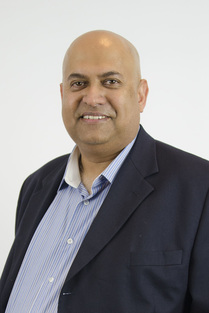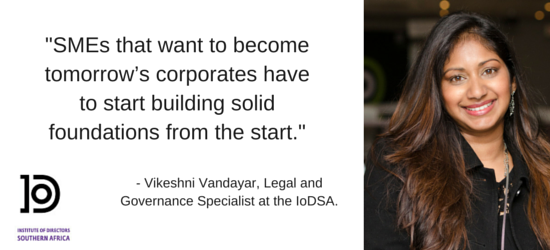|
A new guide published by the Institute of Directors in Southern Africa (IoDSA) sets out to give the SME sector a much-needed boost by helping it to access one of the corporate sector’s most potent success factors: good governance. “Governance enshrines how accountable, responsible, transparent and fair an organisation is run,” says Vikeshni Vandayar, Legal and Governance Specialist at the IoDSA.
The Department of Small Business Development also gave its stamp of approval at the recent launch of the guide. “The Governance in SME guide will greatly aid the Ministry in achieving our task of enhancing the support to small business and co-operatives through adopting it as part of the instruments we use in the department,” says Mr Mojalefa Mohoto, Acting Deputy Director General: Broadening Participation Division (BPD). South Africa’s King III has established itself as the gold standard for corporate governance globally, but SMEs often assume that it is too expensive or time-consuming to implement. Not so, says Vandayar. King III is extremely flexible because it follows an “apply or explain” approach. “Our Governance in SMEs guide aims to help SMEs understand their current state of development and thus the appropriate level of corporate governance required,” she says. “Then as the company evolves, the guide will help the leadership strengthen and adapt its governance framework, in the process clearly differentiating itself from competitors to investors, banks and potential customers.” This sentiment was evident at the event where the guide was launched. One of the attendees gave a valuable recount of his own experience with implementing corporate governance and the value the guide could have provided him at the time. “He raised a valid point as to why it is important for the board/organisation not to just blindly apply King III principles. The board members need to apply their mind so as to ensure that the governance practices implemented are best suited for the SME - whilst still achieving the desired outcomes” says Vandayar. “Overall, SMEs can benefit hugely from learning how to apply the governance best practices to ensure they operate well and build stakeholder confidence,” Vandayar says. “SMEs that want to become tomorrow’s corporates have to start building solid foundations from the start—this guide can help them do just that.” The IoDSA’s Governance in SMEs: A guide to the application of corporate governance in small and medium enterprises has been prepared by the IoDSA and is being distributed with the support of the South African Chamber of Commerce and Industry and the Department of Small Business Development. ENDS MEDIA CONTACT: Cathlen Fourie, 012 664 2833, [email protected], www.atthatpoint.co.za For more information on the IoDSA please visit: Website: www.iodsa.co.za Twitter: @The_IoDSA LinkedIn: The Institute of Directors in Southern Africa group  The recent news of alleged corruption at Glenvista High School highlights the role school governing bodies (SGBs) play in guiding ethical conduct in schools. “Governance principles can be used to guide the appropriate behaviour to ensure decisions are made in the best interests of the school and its stakeholders,” says Vikeshni Vandayar, Legal and Governance Specialist at the Institute of Directors in Southern Africa (IoDSA). “Improved governance in schools has the potential to significantly boost the quality of the education offered at a particular public school, expand its growth and enhance its financial stability,” says Paul Colditz, CEO of the Federation of Governing Bodies of South African Schools (FEDSAS). Colditz further adds “One of the biggest governance pitfalls that leads to instances of maladministration in schools, is that often members of the SGB believe that the requirements of good governance does not apply to them because they are acting on a voluntary basis or not remunerated. The IoDSA is assisting FEDSAS in drafting a school governance guide. “We believe the guide will make a huge impact in understanding the basic principles and best practices of good governance in the school context,” says Colditz. “The idea is to make a publication available in easily understandable and accessible language and format and that would inspire all SGB members to become the best possible leaders.” By SGBs implementing governance principles, improved leadership and decision-making will become apparent. SGBs will have improved tools to monitor and manage risk and improve the confidence of all stakeholders involved with the school - such as learners, teachers, parents, the national and provincial departments of education and local communities in the school environment. The implementation of SGB governance in a public school will constantly adapt and evolve as the performance of the SGB and the school improves. The SGB therefore needs to consider which measures are most appropriate for the specific school. The application of the desired outcomes and any recommendations found in the guide should be viewed in the context of the school’s nature, size and maturity. “The idea is for each SGB to apply its collective mind to the governance principles as to determine which would be in the best interests of the school,” says Vandayar. ENDS MEDIA CONTACT: Cathlen Fourie, 012 664 2833, [email protected], www.atthatpoint.co.za For more information on the IoDSA please visit: Website: www.iodsa.co.za Twitter: @The_IoDSA LinkedIn: The Institute of Directors in Southern Africa group Recent boardroom dramas reveal some common issues with which directors need to come to grips. By Sikkie Kajee CD(SA), facilitator at the Institute of Directors in Southern Africa (IoDSA) A recent training session I conducted at the IoDSA highlighted a few common issues that seem to be causing boards a lot of problems. During the session, we looked at five companies that had or are still undergoing some turbulence, in order to learn from their experiences. While each one of them obviously had their own specific dynamics and personalities, it became fairly easy to discern some common challenges that the boards of these respective companies faced. I would like to highlight three such challenges in this article because, in my experience, they are particularly relevant to South African boardrooms. The need for courage The IoDSA has been highlighting the need for corporate leaders to be courageous for some years now. But the notion of what kind of courage directors need to show is more nuanced than one might expect. The obvious requirement is for directors to ask the hard questions, not to be afraid of ruffling feathers and to be prepared to put forward a view that they believe to be in the best long-term interests of the company. Very often, this could mean advocating decisions that make the company money or provide advantage in the short term but potentially compromise its future. This kind of courage must be exercised within the framework of the collective, and this is not always an easy balance to strike. There is tremendous pressure to go with the group, especially as a divided board is never a good thing for the company. Here’s where the second kind of courage comes in, call it “the courage to be independent”. It comes with none of the drama associated with the courage outlined above. I am talking here about the courage to do your own thinking, to give the company the benefit of your thought processes. This is probably what the overworked phrase “exercising his or her mind” really means. It depends on retaining true intellectual independence, examining the board packs critically, and resisting the temptation to be swept along by the accepted narrative or status quo. Humans are storytellers by nature, and everything we say or do advances a particular story, or view of reality. For a director, the courage to be independent is to remember, at all times, never to surrender to the dominant narrative, be it around the boardroom table or more generally. Striking the right balance of power It was clear from the various cases studies that there needs to be a correct power relationship between several of the governance role-players. The first, and this is particularly evident in the public sector, is between shareholder and board. The State, as sole shareholder, often compromises board performance and effectiveness by making appointments based on political considerations rather than skill, experience and probity; some of our parastatals are hamstrung by ineffective boards whose members do not necessarily have the skills to direct and oversee massive enterprises, and who are potentially distracted by political wrangling. In particular, when the shareholder appoints members of the executive team, their loyalties are divided. This overreach by a powerful shareholder can also be a factor in the private sector. Another potential imbalance of power can occur when a Chairman is able to dominate the board, effectively shutting down all voices of dissent. This is a particular challenge when a charismatic, respected company founder takes on the chairmanship late in life. One of the case studies also highlighted the way in which a powerful CEO can unduly influence the board, at least for a time. Indeed, CEO-Board conflict is a hallmark of several of the case studies. Finding the right Chairman is absolutely critical. Appointing directors of the right quality Ultimately, of course, it all comes down to the skills, professional and personal, that directors bring to the table. Establishing what skills a director actually has, and how committed he or she is to ethical action, is something that is hard to ascertain in an interview. This is why the IoDSA is putting so much effort behind independent facilitation of board appraisals and the establishment of a formal designation for directors, the Chartered Director(SA), or CD(SA) designation. By professionalising the boardroom role, the IoDSA is enabling the skills of directors to be evaluated objectively and expertly, as well as providing ways for directors to expand and update their skills through director development and other initiatives. Even more importantly, becoming a CD(SA) would entail formal acceptance of a professional code of ethics and disciplinary code as well as the ability to revoke the designation under certain circumstances. In conclusion, there is no doubt that directors face numerous challenges when it comes doing their jobs. At the same time, though, just understanding what the challenges entail can be half the battle won. ENDS MEDIA CONTACT: Cathlen Fourie, 012 664 2833, [email protected], www.atthatpoint.co.za For more information on the IoDSA please visit: Website: www.iodsa.co.za Twitter: @The_IoDSA LinkedIn: The Institute of Directors in Southern Africa group
 South Africa’s state-owned enterprises have a key role to play not only in delivering services to citizens, but also in funding the National Development Plan. However, it is clear that many major parastatals are still not in a position to fulfil this mandate. A recent editorial in Business Day places the blame squarely on a lack of governance. Parmi Natesan, Executive: Centre for Corporate Governance at the Institute of Directors in Southern Africa (IoDSA) broadly agrees, arguing that solving this problem begins with the board. “The challenges besetting our parastatals are complex, so it would be naïve to suggest that there is a silver bullet that can magically fix them. But, as many commentators have pointed out, one common shortcoming is the effectiveness of the boards. One of the findings of the IoDSA’s board appraisals benchmark study was that public sector boards lag behind private sector boards in their performance. Given that boards play such an important strategic and governance role, the IoDSA believes that the parastatals should seriously consider a professionalisation mandate including Chartered Director(SA)’s for the boards of state-owned entities,” she says. Natesan says that greater attention needs to be paid to the selection of board members at parastatals to ensure that they have the necessary professional and personal skills, as well as industry knowledge and experience. As the IoDSA’s annual board appraisal benchmarking study consistently shows, public-sector boards suffer from the fact that board members (as well as members of the executive team) are often seen to be appointed or political reasons. “It’s vital that proper due diligence on potential directors is carried out. Being a director is a tough job, particularly in the public sector, and much depends on his or her performance,” Natesan says. “Care must be taken to find and appoint such people, or the board’s—and ultimately the company’s—performance will be adversely affected.” According to Angela Oosthuizen, Chief Executive Officer at the IoDSA, the directorship role in both the public and private sectors is so important and so complex now that the IoDSA has launched a formal professional designation, the Chartered Director(SA), or CD(SA). The IoDSA’s intent is to professionalise directorship. The CD(SA) initiative recognises that directors require specialist skills, experience and integrity alongside their purely business skills. Administered by the IoDSA, the CD(SA) designation gives directors a way to demonstrate their qualifications objectively, and to enhance them through a formal continuous professional development programme. Professional directors also subscribe to a code of professional ethics, and can be subject to the designation being revoked under certain circumstances. A credible professional designation also helps selection committees identify candidates with the right skills, objectively assessed. Oosthuizen says that government is aware of the potential for using the CD(SA) designation as a way of identifying the right calibre of directors. For example, at a recent IoDSA event, the Public Protector, Thuli Madonsela, indicated that the Minister of Public Enterprises, Lynne Brown, would support the certification of directors as part of the appointment criteria for parastatal boards. “The CD(SA) designation is relatively new, so the pool of people entitled to use it is still small, but the Minister should certainly be encouraging parastatal board members to begin the process of certification,” Oosthuizen says. “In the meantime, members of parastatal boards need to keep abreast of developments, attend governance training, and generally make sure they understand their role. Board members who are professional in their attitude, their skillsets and their commitment to a code of conduct will do better for the company.” Another benefit of improving the skills of directors would be the strong signal that government is serious about governance, and that it respects the role that boards have to play. “The board sets the tone for the whole company, oversees its strategy and ensures it is governed properly—a successful company needs a good board,” says Natesan. “If parastatals are going to be able to become contributors to the fiscus, they need to be properly governed, and ensuring that their directors are at the match makes sound business sense.” Editor’s note: Click http://bit.ly/1gGntmW for supportive audio of Parmi Natesan, Executive: Centre for Corporate Governance at the Institute of Directors in Southern Africa ENDS MEDIA CONTACT: Cathlen Fourie, 012 664 2833, [email protected], www.atthatpoint.co.za For more information on the IoDSA please visit: Website: www.iodsa.co.za Twitter: @The_IoDSA LinkedIn: The Institute of Directors in Southern Africa group The Institute of Directors (IOD) Nigeria recently hosted a series of meetings of the African Corporate Governance Network (ACGN) in Lagos. The ACGN was founded in 2013 to help build capacity in corporate governance across the continent, so building better organisations and corporate citizens across Africa. Its members are united in their belief that strong corporate governance is essential to successful, sustainable companies and thus holds the key to African economic growth.
Held over three days the meetings included a member business forum and a keynote presentation by Professor Deon Rossouw, CEO of the Ethics Institute of South Africa, highlighting the cardinal values underpinning good governance: Responsibility, Accountability, Fairness, and Transparency. The Lagos meetings also saw the steady expansion of the ACGN’s membership, with the African Securities Exchanges Association and Society for Corporate Governance Nigeria both signing up as members. An important outcome of the meetings was the finalisation of the publication plan for a joint ACGN/ EY report on corporate governance practices. The report is sponsored by EY, and will cover approximately 15 member countries. It is expected to be released in February 2016. “Regular meetings such as this one play a critical role in building the ACGN across the African business and public-sector landscape,” says Jane Valls, chair of the ACGN. “They offer members an opportunity to network, to hear new ideas and, most importantly, to welcome new members. The EY report is an important project because it will give us all an insight into the state of corporate governance across some of the continent’s major economies, and a benchmark against which we can measure the ACGN’s impact on African governance over time.” “The continuing expansion of the ACGN is good news for Africa’s growth prospects,” says Angela Oosthuizen, CEO of the Institute of Directors in Southern Africa. “South Africa is fairly mature in corporate governance terms, having released the first King Code in 1994 and with the fourth revision now underway. We are committed to making our experience available to our colleagues in the ACGN, and hope that King IV will act as a benchmark for African codes of corporate governance.” ENDS MEDIA CONTACT: Cathlen Fourie, 012 664 2833, [email protected], www.atthatpoint.co.za For more information on the IoDSA please visit: Website: www.iodsa.co.za Twitter: @The_IoDSA LinkedIn: The Institute of Directors in Southern Africa group |
Archives
July 2024
Categories
All
|
||||||


 RSS Feed
RSS Feed